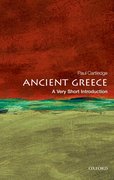In 2006 the Frank Miller-Zack Snyder bluescreen epic 300 was a box office smash. The Battle of Thermopylae – fought between a massive Persian invading army and a very much smaller Greek force led by King Leonidas and his 300 Spartans in a narrow pass at the height of summer 480 BC – had never been visualised quite like that before. So affecting was its portrayal, indeed, that it prompted the Iranian delegation to the United Nations to lodge a formal complaint at the way the Persians had been depicted, or rather denigrated as subhuman monsters — as if George ‘Dubya’ Bush had any interest in that very ancient history! But on one thing the Iranian delegation — and the filmmakers — were entirely correct, historically speaking. The Battle of Thermopylae was indeed a key part of a series of battles — otherwise known as the Graeco-Persian Wars — that were a genuine struggle for civilisation, a decisive culture clash on a world-historical scale.
The forthcoming sequel to 300 is now announced for March 2014. It is called imaginatively 300: Rise of an Empire and will reawaken all those old questions and anxieties about East-West culture clash and the history of western civilization as a consequence. I can’t wait. But there’s another element to the conflict that shouldn’t be allowed to pass in silence. The ancient Greeks were a very competitive, indeed antagonistic lot. No sooner had the Spartans and Athenians and their respective allies defeated the Persians jointly, fighting shoulder to shoulder by land and on the sea, than they embarked on a bitter cultural war against each other — for priority and supremacy of commemoration. Which of the big two Greek cities deserved the credit (or a larger share of the credit) for leading the Greeks to victory and so ensuring that Greece would be free from culturally alien Persian domination?
Sparta and Athens were very different Greek cities, as different almost as they could possibly have been while still remaining distinctively ‘Greek’. Sparta was the model military state, under constant military discipline, and averse to the disorderly free-for-all of democratic politics. Athens on the other hand was the western world’s first democracy or ‘People-Power’, run by ordinary self-governing Athenian citizens. Actually it was the combination of their very different qualities on the battlefield — Spartan soldierly discipline and training, Athenian brio and dash — that were crucial to the patriotic Greeks’ eventual major victories by sea (Salamis) and on land (Plataea). But neither would give way to the other in the commemoration stakes. The Spartans enlisted the famous Greek praise-singer Simonides in their cause, to celebrate the decisive land victory at Plataea in 479 BC, but Herodotus, the Western world’s first proper historian, gave the lion’s share of the credit to Athens for its contribution to the naval battle of Salamis in 480.



Recent Comments
There are currently no comments.